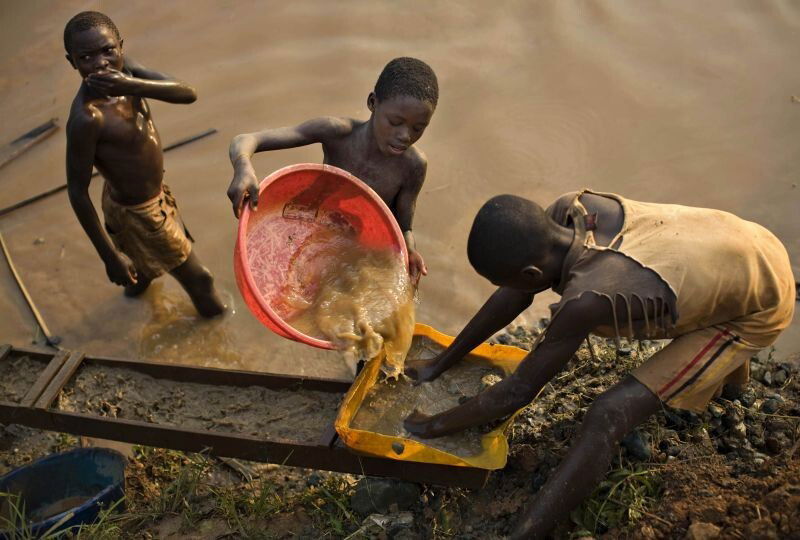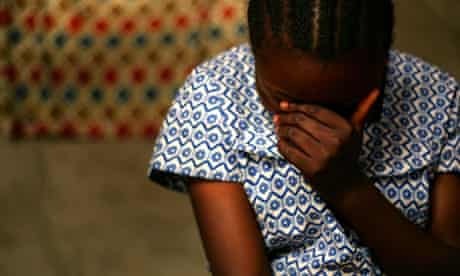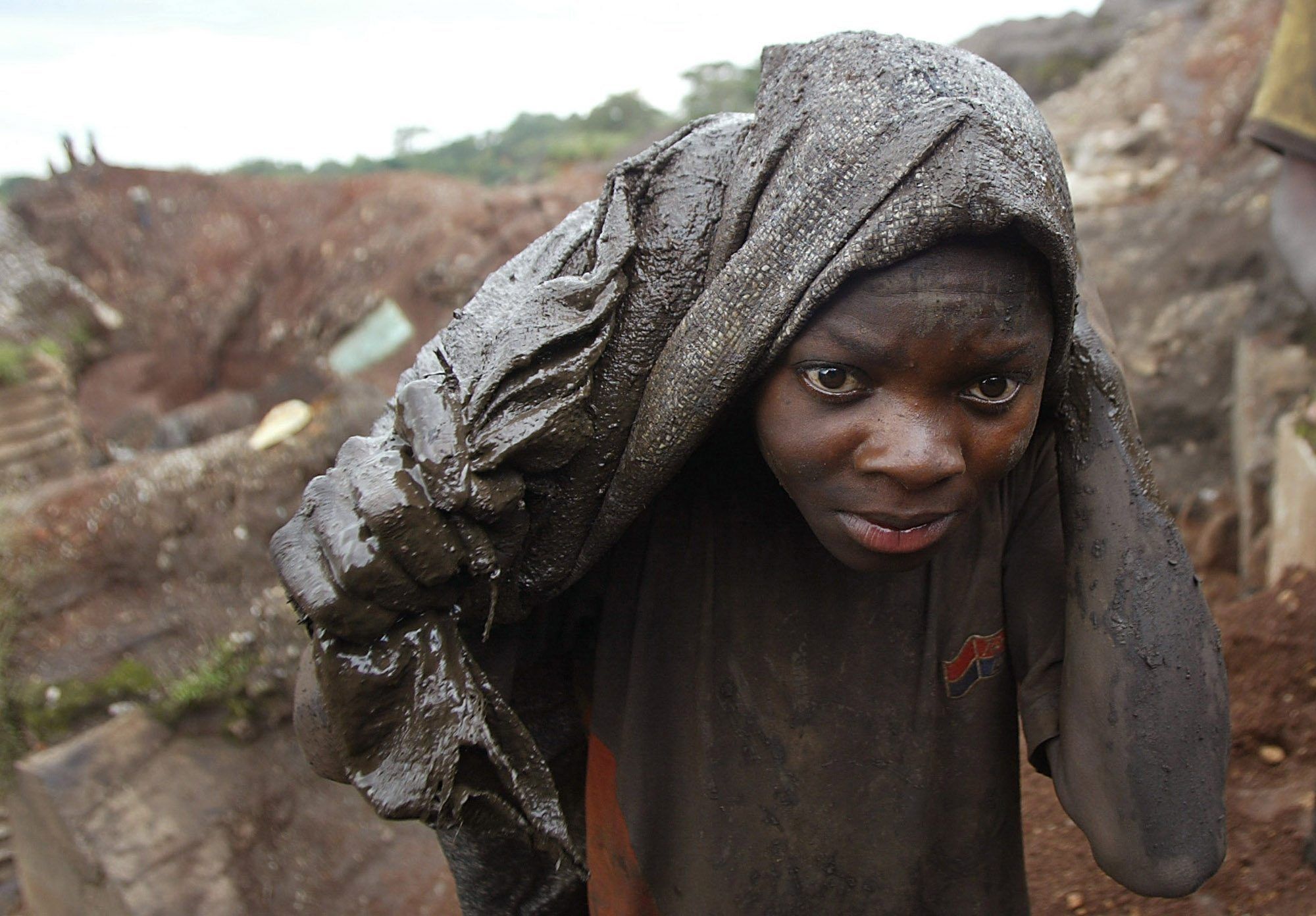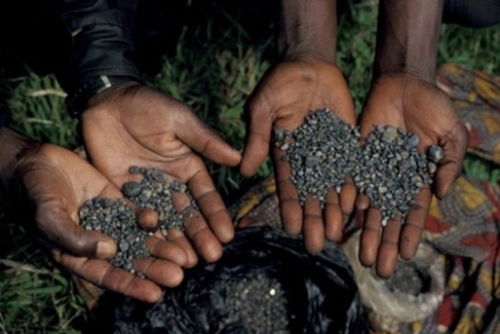BLOOD PHONES

BLOOD PHONES
by William Thomas
The next time your cell phone rings and you bring it up to your ear, listen closely. You may be able to hear the muted echoing screams of women and girls being raped by greed-crazed, frightened men intent on obtaining a tiny piece of mineral used in your phone. It’s called coltan. And the frenzied rush for its extraction in strip mines across the Congo is exploiting children, razing pristine forests, endangering rare mountain gorillas – and has already led to the rape and horrific mutilation of more than 250,000 women as old as 75 and girls as young as three. I could not bring myself to show the picture of a “soldiers’ hacking off the severed stump of a raped, naked woman with his knife.
Short for columbine tantalite, coltan is in huge and gowing demand by high technology industries rushing to meet a consumer frenzy for brain numbing, irradaiting gadets. Its high melting point and resistance to corrosion coupled with its unique ability to conduct heat and electricity make coltan particularly prized in cell phones, as well as wireless laptop computers, TVs and other consumer “bads” marketed and sold as “goods”.
Coltan is mainly extracted from chopped down Congo forests, where strip-mining is carried out by workers, many of them children. More than 10,000 people have abandoned their farms and urban centers and moved into the Kahuzi-Biega National Park to cut down the pristine forest, home of endangered gorillas, and mine coltan under the direction of rebels, who continue raping women as “needed”. [IUCN Apr 23/01; Global Witness 2004; World Rainforest Movement Nov 14/05; assets.panda.org; PRNewswire]

THE GREATEST SILENCE
Michael Winship met Lisa Jackson while working in television in Washington, DC. Showing on HBO, Jackson’s latest TV documentary - "The Greatest Silence: Rape in the Congo" – exposes what Winship terms, “the unimaginable human tragedy in the third largest nation on the African continent. “As underreported as the horrific genocide in Darfur, Somalia, has been, it's front-page, headline news compared to the untold, unbearable and far vaster suffering of the Democratic Republic of Congo.
Civil war began there in 1997 and has never really ceased. Further fueled by neighboring rebels from Uganda, Burundi and Rwanda, this is the deadliest conflict since World War II, with four million killed in a decade of fighting and an estimated more than 250,000 women and children raped.”
The rebels aren't the only ones guilty of mass rape, Winship points out. “Members of Congo's own military are culpable, too, and even some of Winser's 17,000-member United Nations peacekeeping force have been accused of trading milk and eggs for sex with girls as young as ten.”
Because Lisa Jackson had been gang-raped by three men one night in Washington's fashionable Georgetown, she was able to win the trust of traumatized rape victims in the Congo. “They asked about the war that was happening in my country. I told them there had been no war in Washington, DC, back then, that any woman could become a victim at any time," Jackson relates.
What these women tell her camera is "soul-ripping," Lisa Jackson says. One woman, describing the three years she spent as a sex slave, says, "When we were living in the forest it wasn't just one man. Every soldier can have sex with you. We got pregnant there. We gave birth in the forest, alone, like animals, without food or medicine."
Her story is far from the worst told in "The Greatest Silence."
The Congo remains rich in gold, silver, diamonds, oil, uranium, Winship lists. But that’s not all. Fully 80% of the world's supply of coltan – a mineral essential for the manufacture of capacitors used in most consumer electronics, particularly cell phones and wireless laptop computers – is also being raped from the living earth of the Congo, where smugglers steal one million dollars worth of coltan every day.
Addressing the Senate Judiciary and Foreign Relations Committees after screening "The Greatest Silence," and then testifying before the Senate Subcommittee on Human Rights and the Law, Lisa Jackson told the U.S. legislators that, because of the coltan trade, "the blood of Congolese women is on your laptops and in your cellphones." Maj. Honorine Munyole of the National Police is a one-woman Special Victims Unit investigating sex crimes. As she puts it, "The woman is the mother of a nation. He who rapes a woman rapes an entire nation." [truthout Apr 1/08]
CELL PHONES ENDANGERING GREAT APES
A second television documentary – this one British – has also exposed how the precious mineral Coltan, essential to mobile phone technology, is driving Africa’s great apes to the brink of extinction. "No Hiding Place - Part Two" of the BBC’s “Earth Report” series shows how coltan raped from the Earth in huge “strip” mines by exploited manual labor is being used to make the pinhead capacitors that regulate voltage and store energy in mobile phones, the Environment News Service reports.
According to ENS, “The mineral, which is the linchpin of multi-billion dollar corporate cell phone profits, is obtained almost exclusively from the Democratic Republic of Congo, where this eastern lowland gorilla is completely dependent on intact forests.”
Now in steep decline, eastern lowland gorilla populations need all the help they can get. In just the last five years of the cell phone boom, these eastern lowland gorillas have declined by 80% to 90% – with just 3,000 or so animals left alive on this planet.
Renowned for her 40 years of work with chimpanzees, primatologist Dr. Jane Goodall has told TVE producers that the problem has become even more serious as big logging companies - especially European clear-cutters - have opened up the forests to bushmeat hunters who kill wild animals, not for subsistence but for sale to urban customers.
"Hunters from the towns go along the roads and shoot everything - elephants, apes, monkeys, bats and birds," Goodall said. "They smoke it, load it on to the trucks and take it into the cities. It doesn't feed starving people, but people who'll pay more for bushmeat. Goodall noted that after living in harmony with the forest for centuries, pygmy hunters are being given guns and ammo and paid to shoot wild animals to feed the logging camps destroying their homes and way of life. "The animals have gone, the forest is silent, and when the loggers finally move what's left for the indigenous people? Nothing," Goodall said.
After being hit by the deadly Ebola virus and the destruction of the mountain forests in the relentless hunt for “bush meat” and coltan to sell to upscale Western markets – the world’s last 700 mountain gorillas live where Rwanda, the Democratic Republic of Congo and Uganda meet.
Rebel forces under command of the dissident Congolese general Laurent Nkunda have taken over large areas of the park, forcing out the rangers and leaving the gorillas vulnerable to poachers. The rebels, and related opportunists flooding into the Congo for coltan, have also raped a quarter-million women and girls. [ENS July 17/02; BBC News Feb 20/08]
Now that the three countries are coming together to protect the great apes, there is some hope for the gorillas. But the smugglers, rebels, loggers, UN personnel and other gangs continue to roam the Congo. The fate of Congolese women and girls caught in the frenzy to supply coltan to Western cellphone manufacturers is as yet unknown.

DIAL “R”
Dial “c” for clearing Congolese rainforest. Dial “g” for gorilla. Dial ‘s’ for strip mining. Dial “r” for rape.
“Women are dying two types of death,” says Christine Karumba, Country Director, Women for Women International in the “Democratic” Republic of Congo. “The two types of death are the physical and the emotional death. The physical death is where you are no longer alive to walk the earth, and the emotional death is where you no longer see signs of hope and are dead inside.”
“We had so many difficulties in this war,” relates Yvette, 15. “The military pillaged our house and they killed my aunt in May 2004. I was studying in fourth year of primary school when a government soldier raped me. He took me on the road by force when I left school. He was the first man that I knew and he raped me. Then he carried me to his military camp and he left me there like his wife.” [BBC News 24]
During the coltan shortage between late 1999 and early 2001, when supply was falling behind the world’s voracious demand for cell phones, a kilo of coltan fetched $200 at a time when the Rwandan mercenary army was exporting at least 100 tons – or $20 million – per month. Experts and dealers estimate that Rwandan mercenaries made at least $250 million over a period of 18 months – enough to protect the companies extracting the coltan and finance a war that has so far filled more than six million people.
“Governments won’t do anything” – above taxes from the companies and their employees – Whitehall “made £3 billion from the mobile phone companies from the sale of the 3G licenses” last year. “And you only need to sit on a London bus for five minutes to see how important mobiles have become to people’s psychosocial identities.”
A UN report cites “something like $200-250 million” worth of coltan going out through Goma every month. Another source puts current coltan sales at $18-20 million a day in a region known for rape, bloodshed and poverty.
While some coltan is mined in Australia, Brazil and Canada, there is a 4 in 5 chance that any mobile phone is a ‘blood mobile’. According to Ethical Consumer, there is not a single mobile company revealing its coltan sources – “so presumably they all use DRC Coltan,” as one blogger named Jonathan puts it.

Photo Captions:
Children digging coltan in the Congo -morungexpress.com
Coltan laborer for Western cell phones -la-croix.com
48 women are raped every hour in the Congo-theguardian.com
Coltan